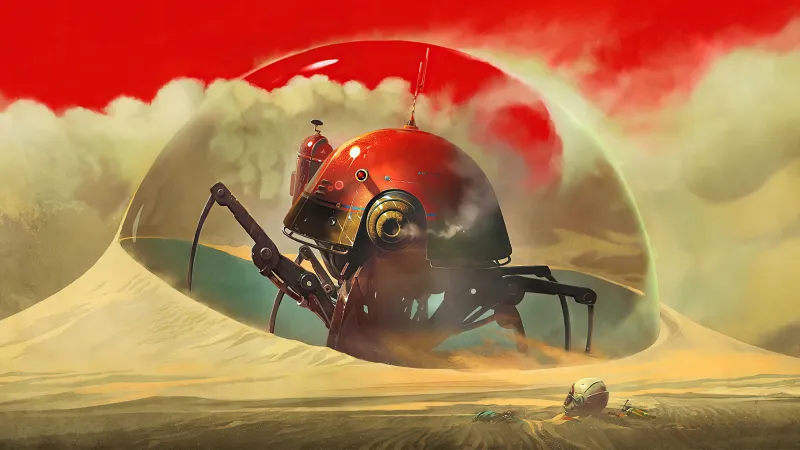When discussing the founding of Starward Industries, game director Marek Markuszewski brings up all the points you might expect from a new team. The company wanted to gather a group of experienced but still-passionate developers, all focused on the idea of creating something ambitious despite the studio’s smaller size. The surprise, however, comes from the studio’s approach to narrative. According to Markuszewski, Starward looked for stories that weren’t already “exploited” by media when figuring out its first project. It wanted to tell a story that hadn’t been told.
Admittedly, where Starward landed was a story told before – almost 60 years ago, in the novel The Invincible, written by Stanisław Lem. In it, the crew of the Invincible spacecraft investigates the planet Regis III for its missing sister ship. There they discover self-replicating machines that, over time, become more hostile. It ponders questions about what it means to be alive, the ever-increasing role of technology in everyday life, and has more than its fair share of retro-futurism, proper nouns, and heady jargon.
For Starward, comprised of developers previously from CD Projekt Red, Techland, and more, it was the right fit for its narrative ambitions – something dense and literary. And for what it’s worth, video game adaptations of novels are relatively rare.
In Starward’s The Invincible, you assume the role of Yasna, a scientist. In typical video game fashion, the protagonist is a somewhat unreliable narrator. She knows she’s a scientist. She knows she came here with a crew that’s since gone missing. But many of her memories are foggy. A voice on the other end of an earpiece, that of the “Astrogator,” helps you along your journey.
It’s all fairly standard video game fare, though the source material is an interesting starting point. Lem was known for his approach to hard sci-fi, and the world of The Invincible feels well-realized and believable within its fiction. It’s perfectly conceivable to imagine it translating to a video game well, where players are incentivized to explore, experiment within, and discover the world around them. And for the next hour, with insights from the team, I have the chance to do just that.
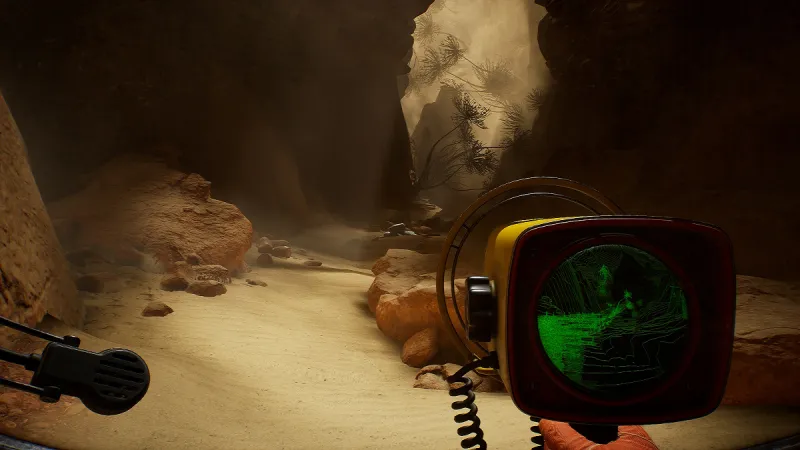
Slides
My time playing an early pre-alpha build of The Invincible begins with Yasna exploring her surroundings, taking note of her findings, and reporting back to the Astrogator. I’m looking for a lost convoy – and perhaps other survivors. Things aren’t going well.
One of the most immediate things about The Invincible is that fidelity-wise, it looks great. Textures have lots of definition – I can really tell these are rocks everywhere I look – and the bright bask of the sun gives off a feeling of warmth as it bakes the ground around Yasna. Regis III mostly looks like Mars – red, arid, dull. But in a way that drives home the desolation of the setting. There isn’t much to do in The Invincible other than go forward and look around. The environment gets that point across.
So, forward I go. I can go around stealthily or move directly to my objective. I choose to take the direct route. After a short drive, I find one of the convoy’s vehicles trapped under a collapse of rocks. Yasna notes that the radiation levels in the area are high. I climb through the vehicle and out the other side of the collapse, running across a machine that will soon mean trouble: a mobile antimatter cannon. Well, two, to be specific. One intact. One destroyed. Nearby is a massive tunnel blown clean through a rock face. One final discovery awaits me: a corpse.
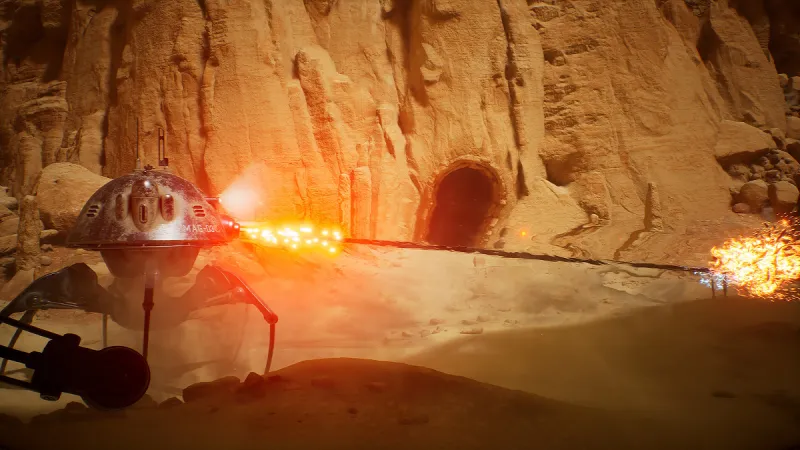
Yasna removes the onboard recorder from the antimatter cannon, and the scene of carnage in front of me begins coming into focus. Yasna sees the missing convoy marching towards its destination. Things seem to be going well. However, the plan goes awry upon reaching Yasna’s current location.
One slide shows the team using the antimatter beam to make their own path through the rock, retrieving materials from the tunnel they created with the antimatter cannon. The next slide shows the convoy rushing out of their new hole. Another shows the cannon firing into the hole. And then, chaos. One of the antimatter cannons shoots at the other, obliterating it, before turning its beam onto the humans. As you might expect, it tears them apart. “It’s monstrous what the antimatter beam does to the human body,” Yasna remarks. Finally, she looks at the final slide, a still image of herself just moments ago inspecting the cannon. She’s shocked but decides to continue her exploration, turning her sights to whatever’s on the other side of the tunnel.
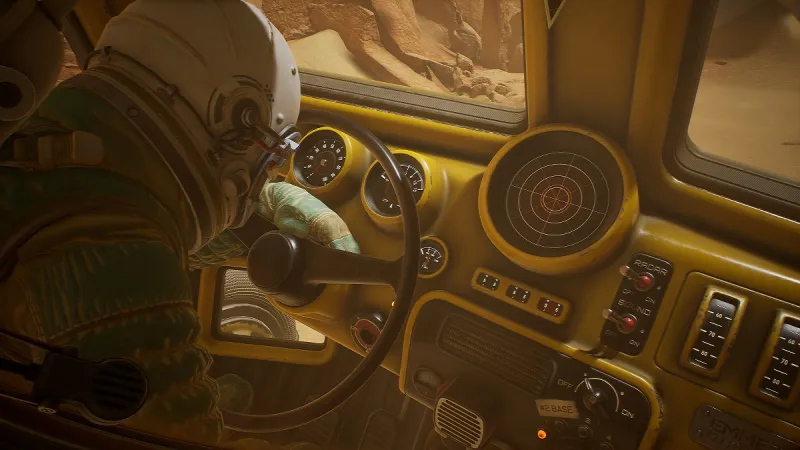
Dense
It doesn’t take long to figure out The Invincible is a slow game – both literally and narratively. It takes time to do just about anything, from walking to your objective (there is, thankfully, a sprint button which I found after some time in the menus) to listening to Yasna and the Astrogator talk, which they do – a lot.
According to Markuszewski, this is a deliberate choice, which makes sense. The work of Stanisław Lem is, again, dense. Lem is often categorized as a “hard” sci-fi author, meaning the work is focused on being scientifically accurate and believable based on current technologies and theoretical possibilities.
“He was kind of a prophet, writing about things like [the] matrix, ebooks,” Markuszewski says.
“Internet,” art director Wojtek Ostrycharz adds.
“Internet, cell phones,” marketing manager Maciej Dobrowolski pipes in. “All those things, yeah.”
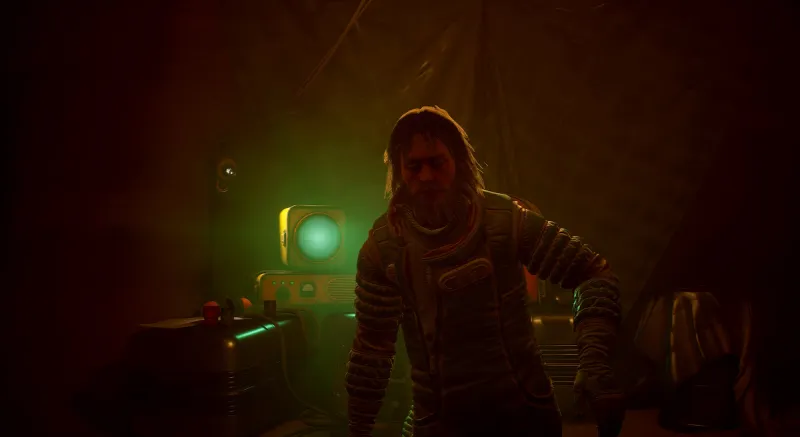
It takes time for that information and exposition to be relayed to the player via visuals and dialogue. As Markuszewski points out, in a book, you can spend as many pages as you want to describe how something looks or a character’s thoughts and feelings. Video games don’t quite have that luxury; adapting The Invincible into something interactive has been a challenge.
“If you’re going with the much more conventional approach, like real-time action, leading a character, being in the place – normal pacing, normal speed – you don’t have this stop-moment [to visualize] all the very attractive parts of the book,” Markuszewski says. “It’s tricky to have really short slots for describing all the emotions or concepts [that we want to discuss].”
Based on my time with the game, I think Starward could work on that balance more. Contrary to what Markuszewski says, I spend a large portion of my playtime doing very little, just listening to characters speak, occasionally choosing a dialogue prompt. If there’s one major issue I have so far, it is the game’s pacing. It’s hard to know how much Starward can fix this before launch, but with such an interesting story concept, it’s a shame that it’s delivered in often-tedious ways.
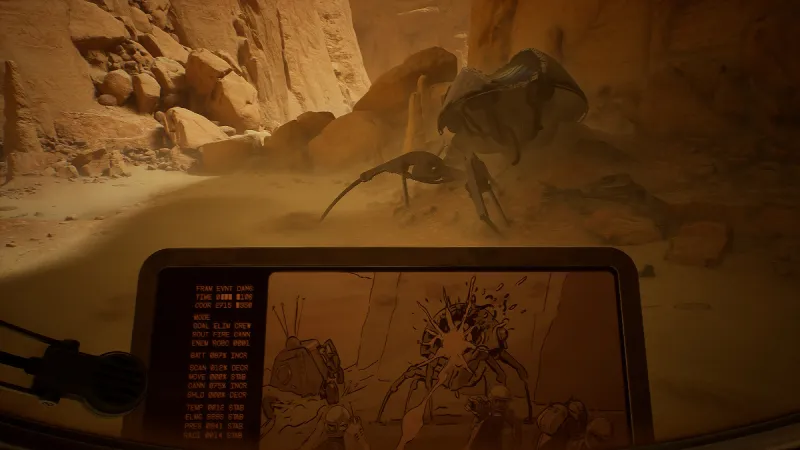
Danger
At the end of the tunnel, I find a little robot carrying a crate in circles around a cave. Yasna later notes the robot is stuck in his task.
Deeper in, I find metallic plants growing from the cave walls. Yasna and the Astrogator then debate the nature of biology – whether or not the metal in front of us can be classified as alive or not if it lacks things like membranes, organs, and the like. All very heady stuff, with the jargon theoretical science fiction fans eat up, slowly doled out as you stand still, waiting for The Invincible to give you your next objective.
On my way to my new point B, my little robot, for reasons never made abundantly clear, breaks his loop and begins walking out of the cave. I follow suit, making my way back to the location with the two antimatter cannons. As my mechanical companion walks along his new route, making his way on a new adventure, the in-tact antimatter cannon springs to life. It shoots the robot, completely disintegrating it, before turning its cannon towards me.
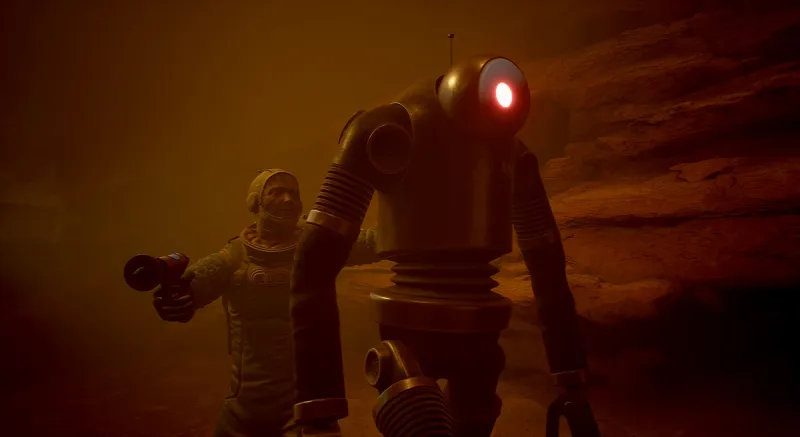
I ready my hands to dodge out of the way, then to fight back, to save my own life from what would otherwise be sudden death. I remember those slides I slowly looked through, recalling the way it tore through the convoy. I’m ready to use their failures to my advantage, to save my own life from utter destruction. On the other end of the line, Astrogator begins panicking, knowing I’m likely mere seconds from death. “Fight,” he yells into my ear.
To not spoil anything, I’ll stop short of revealing more of what I played. If you’re excited for The Invincible or a fan of the novel, some of the narrative moments you’re looking forward to come next. After this initial set-up and some further exploration, I will say that I’m left with many questions about what’s happening on Regis III and who is on the desolate planet.
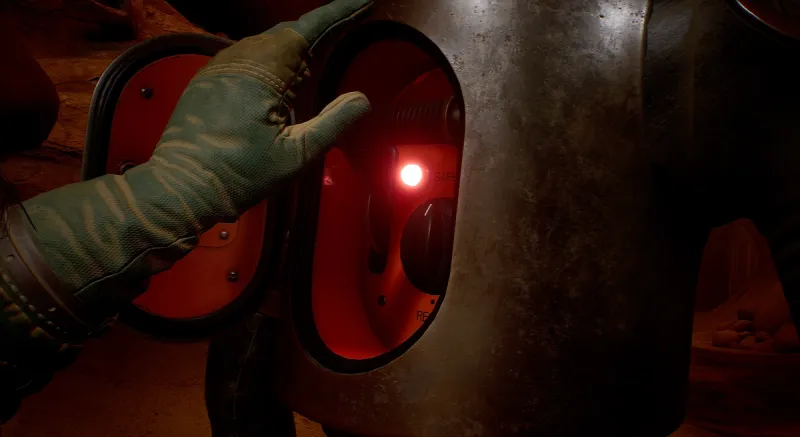
Think
My numerous questions stem mainly from seeing a later-stage mission largely out of context. One conversation between Yasna and Astrogator stands out to me – the earlier chat about the metal plants, biology, and the human condition.
I don’t think that particular moment has anything interesting to say – or anything other games haven’t already explored in great detail, such as 2017’s Nier: Automata, for example. But I do like a video game asking these questions – if only because it’s a rare example of a big-budget game taking the time to explore more nuanced, mature questions, even if a specific moment isn’t adding too much to the conversation. In its current form, I have problems with how The Invincible is telling its story structurally, but I can’t help but feel like its themes are a welcome change of pace. And I feel that’s exactly what Starward was going for – that the developers want players to think about new concepts and ideas.
“I had this one great feeling when I was playing Persona 5, where after an hour and a half of playing that game, I actually had to stop, go outside, have a cigarette, and go, ‘Oh my God, I can’t believe what this game is about,’” Starward’s community manager Michał Napora says. “Maybe people don’t need to go at [it in] this extreme way – go out and smoke cigarettes – but it’d be cool if they finish the game and maybe thought about some things that they didn’t think about before.”
This article originally appeared in Issue 346 of Game Informer.

